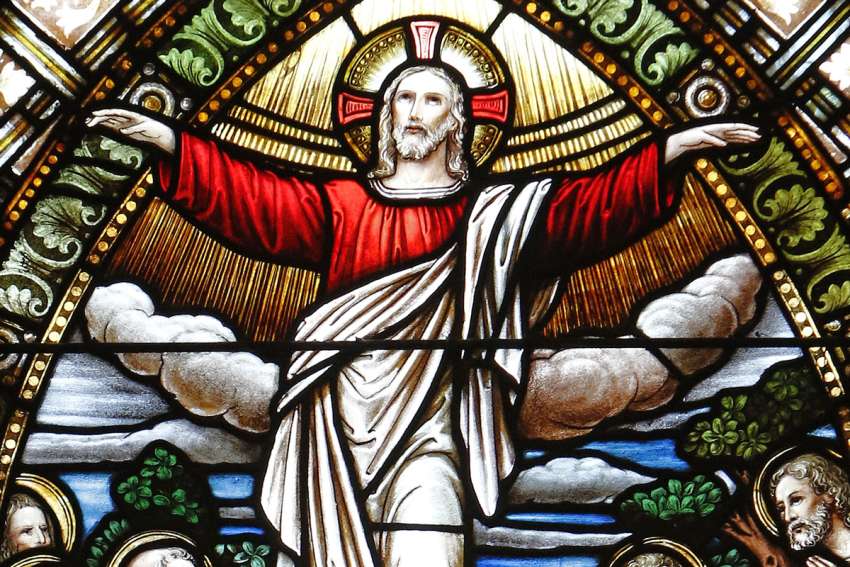But it finally came time for His definitive departure. In Mark and Matthew, the Apostles were instructed to meet Jesus in Galilee. Luke has a different take — Jesus ordered them to remain in Jerusalem until they had been empowered by the Spirit from on high. The Apostles had a burning question: when are you going to restore the kingdom of Israel and kick the hated Romans out? Jesus politely but firmly refused to answer — that was far above their pay grade and was no concern of theirs. God’s concerns are different from those of humans, and God definitely had plans for them all. They were to be witnesses to the Lord Jesus to the ends of the Earth. The presence of the Romans was irrelevant in comparison.
The disciples watched in amazement as Jesus appeared to be taken up into Heaven, His earthly mission having been completed. His ascension should not be understood in spatial terms — He is not “up there” somewhere in the sky, but on the highest spiritual plane of existence. Two figures stood at their side — presumably angels — and gave them strongly worded advice, which is also meant for us. Why are you looking up to the heavens? There is no need — when Jesus comes, it will be in your midst. Look around you — this is where you will find Jesus, and this is where your mission is. Jesus is to be found in everyday life and in other people. Tending to the well-being of others and to the common good is far more important than whatever personal agendas people might have.
The people of the New Testament expected the imminent return of Jesus, but 20 centuries have passed and we are still here. Our work is not yet finished — we could say that it has barely begun. From God’s perspective, time is meaningless. Humanity needs to settle down and begin taking seriously the fact that God dwells in our midst, and that the kingdom of God is within and among us.
We experience the ascension in an interior fashion when our minds and hearts (hopefully) ascend to God as we progress on our spiritual journey. Paul prays that as his community comes to know God that they will be gifted with a spirit of wisdom and revelation. He also prays that the eyes of their heart — their inner understanding — may be enlightened. This will enable them to comprehend the power, glory and generosity of God and to understand that Christ is the ruling principle of the cosmos.
The great commission, as it is called, has been obeyed by many over the centuries. On the surface, it is an order to convert the world. It has been a blessing and joy for many on the receiving end of these missionary efforts, but it has also been a source of pain and destruction for others. There are a couple of caveats that are often overlooked. First, Jesus told them to make disciples of all nations. It was never supposed to be about numbers or filling churches, but about sharing a way of life and the love of God. Force of any kind is forbidden and respect for human dignity, freedom and cultural diversity must always be guarded rigorously. As the sad history of Christian interaction with Indigenous peoples testifies, this was often ignored. Many cultures suffered irreparable damage that continues to this day.
Second, those who dare to make disciples of others must first be disciples — real disciples — themselves. Too often the spread of the Gospel was compromised by entanglement with worldly interests, greed and lust for power. We cannot give what we do not ourselves have, especially humility, honesty, justice and unremitting kindness.
Jesus ended His discourse with some of the most consoling words in the Gospels: “I am with you always, to the end of the age.” Taking this to heart would drive away much of our fear and doubt. It is also the most important message that we can share with our frightened world.


